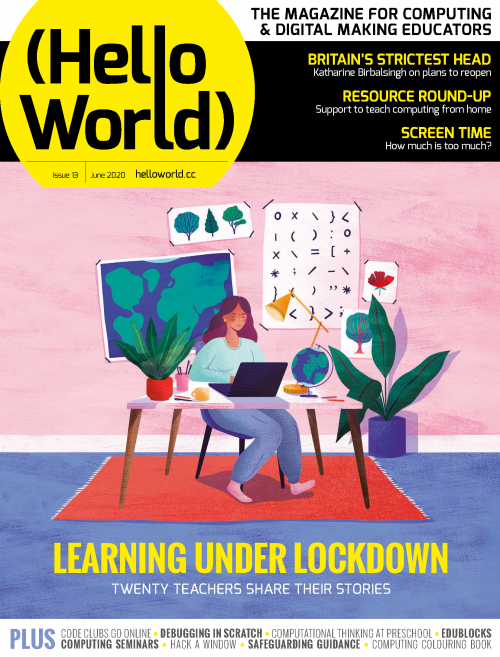How has computing education changed over the last few months? And how will the coronavirus pandemic affect education in the long term? In the introduction to our newest issue of Hello World, our CEO Philip Colligan reflects on the incredible work of front-line educators, and on the challenges educators and students will face.

In just a few short weeks, the coronavirus pandemic has had a profound impact on every aspect of life, not least education. With 1.2 billion young people affected by the closure of schools, teachers have joined health and care workers, and the many others, who are on the front line of the fight against the virus.
As chair of governors at a state school here in Cambridge, I’ve seen first-hand the immense pressure that schools and teachers are under. The abrupt transition to emergency remote teaching, caring for the most vulnerable students, supporting families who are experiencing the health and economic devastation wrought by the virus, and doing all of this while looking after themselves and their loved ones. The word ‘heroic’ doesn’t feel nearly sufficient to describe the efforts of teachers all over the world.
At the Raspberry Pi Foundation, we wanted to learn about how different schools have responded, what’s working, what the challenges are, and crucially, what is happening to computing education. We spoke to teachers at primary schools, secondary schools, and further education colleges. Most were based in the UK, with a few in India and the US.
Even from this small collection of interviews, we saw incredible innovation and resilience, coupled with a determination to ensure that all young people could continue learning during the lockdown.
Most of the teachers that we spoke to were specialists in computing. Their expertise with technology has put them centre-stage, with many stepping into leadership roles, supporting the rapid roll-out of online learning, and providing invaluable support to colleagues and students alike. We hope that this leads to schools giving greater priority to computing education. Digital technologies are keeping the world connected and working. Equipping all young people with the ability to harness the power of computing has never been more vital.
We’ve also seen profound challenges. The digital divide has never been more apparent. Far too many young people lack access to a computer for learning at home. This is a problem that can be fixed at a cost that is trivial compared to the long-term economic impact of the educational disadvantage that it causes.
But we’re also hearing first-hand how educational disadvantage isn’t just about access to technology. Many families are struggling to support home learning, whether because of the condition of their housing, their work or caring responsibilities, or the struggle to put food on the table. Teachers have responded compassionately, offering practical support where it’s needed most, and planning now for how they will help students catch up when schools reopen.
We know that school closures disproportionately impact the most disadvantaged students. If we are going to reduce the long-term economic and social impact of the virus, there needs to be a huge global effort to invest in addressing the educational impact that it has caused.
As we start to figure out what a post-lockdown world might look like, the only thing that feels certain is we are facing a long period of disruption to formal education. We need to find new ways to combine online learning, classroom and remote teaching, mentoring, and non-formal learning experiences, to ensure that all young people, whatever their backgrounds, are able to thrive and fulfil their potential. The stories we’ve heard from these educators give me hope that we can, but they will need the support of government, industry, and nonprofits. The Raspberry Pi Foundation is committed to playing our part.
Get your free copy today!
Besides the Learning in lockdown feature, issue 13 of Hello World contains articles and opinion pieces on managing screen time, safeguarding in online lessons, and how the education landscape is shifting at an unprecedented rate.
We’ve also collected together some of the best free resources for online learning, and we share fantastic activities in our resources section.
Download your free copy to read about all this and more!
And if you’re an educator in the UK, you can take out a free subscription to receive print copies of Hello World.
The post What are the effects of the pandemic on education? | Hello World #13 appeared first on Raspberry Pi.
from Raspberry Pi https://ift.tt/2XFSsaQ


No comments:
Post a Comment
Please do not enter any spam link in the comment box.